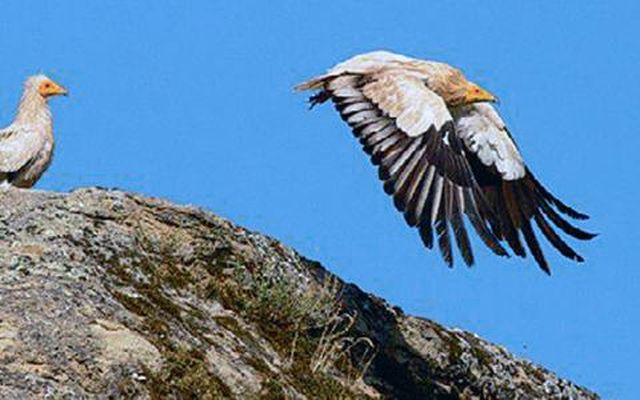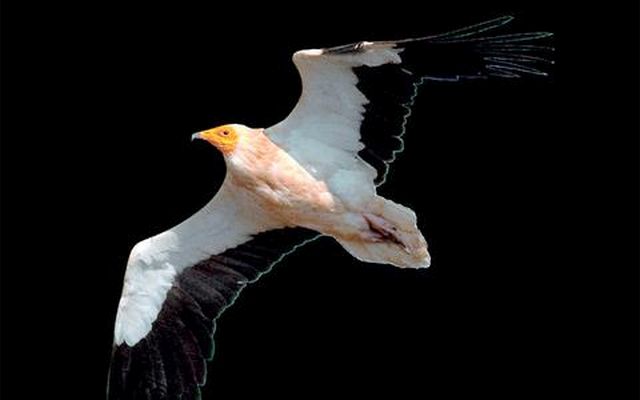Photos: Ethnos
A few weeks ago, the Egyptian vultures, the symbol of Meteora, began to return to Greece. They have survived, flying over Egypt, Israel, Syria and Turkey, where there are battles, but they are threatened by death in peaceful Greece where unscrupulous people place poisons in nature.
The illegal use and distribution of poison baits threatens Egyptian vultures with extinction and today, there are only a few pairs in the region that was once the habitat of the largest colony of these birds in Greece.
Over the past 30 years, the population of Egyptian vultures in Meteora has decreased by over 80%. Today no more than 15 pairs live in the country, and in particular in Thessaly, Epirus, Central Macedonia and Thrace.
Since 2011, the Bulgarian and Hellenic Ornithological Societies have implemented programmes in both countries to prevent this species from extinction. Today the Greek city of Kalambaka is hosting a seminar on Egyptian vultures and tomorrow the Museum of Natural History of Meteora will host various activities involving students from the local elementary school.

Data
The Egyptian vulture is an endangered species worldwide. It is the smallest of the four vulture species that are found in Europe. The wingspan of Egyptian vultures measures only 180 cm and the body length 60 cm. They nest in precipices and rocky cliffs, and use the same nest for years.
In Egypt, the bird was venerated as a symbol of parental care and pharaohs protected it from attacks by the death penalty.
The Egyptian vulture symbolizes the first letter of the hieroglyphic alphabet and the image of the bird is found in many Egyptian monuments. Today, experts consider it as one of the smartest birds on the planet, as it is one of the first species in the world for which it has been discovered that it uses tools. Moreover, it is the only species that "teaches" the other representatives of the same species tricks – the Egyptian vulture shows the other birds how to choose the right stones and how to use them to break ostrich eggs in Africa for example.

As explained by Roula Tringou, information coordinator at the Hellenic Ornithological Society, one of the main causes of the dramatic reduction of the Egyptian vulture population is the illegal use of poison baits in nature in Greece, a phenomenon that has recently reached alarming proportions.
30 poisoned animals and over 10 kg poisonous baits have been found over the past nine months alone. The most recent case is of 19 March in the village of Pertouli, Trikala region, where two dogs and one fox were poisoned and 23 toxic baits were found in the region of the local training and experimental forestry.
Extinction
This illegal practice very often is the cause of extinction of various birds of prey from many areas of the country. A typical example is the largest colony of vultures in the region of Epirus, north-western Greece, which became extinct in 2012 because of mass poisoning of the river valley of Nestos (Mesta). Two Egyptian vultures were found dead in Serres the same year, one of which had a satellite transmitter on its back. The birds had arrived from the Republic of Chad to spend the winter in Meteora.
Under the programme LIFE +, “Return of the Egyptian Vulture”, specially trained dogs, Kiko and Kuki, search for, and find, poison baits, and together with their guides, they have been on duty more than 100 times and have traversed hundreds of kilometres. The dogs work primarily in Dadia National Park, in Meteora and in Chasia - Antichasia massif where the Egyptian vultures live.